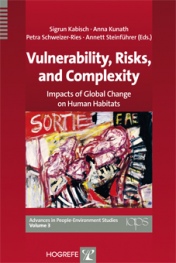Social Vulnerability and Resilience of Young People: A Pilot Study in Fortaleza
 Livro: Vulnerability, Risks, and Complexity - Impacts of Global Change on Human Habitats
Livro: Vulnerability, Risks, and Complexity - Impacts of Global Change on Human Habitats
Capítulo:
Co-autora: Luciana Miranda Lobo
Editora: Hogrefe
Edited by S. K. Kabisch , A. K. Kunath , P. Schweizer-Ries , A. S. Steinführer
State-of-the art research on the interrelations between the social, built, and natural environment
This volume offers state-of-the-art research on the interrelations between the social, built, and natural environments.
It will be useful to scholars in cross-cutting areas of urban, hazard, planning, governance, and sustainability research in relation to socio-psychological perspectives. Readers will benefit from new theoretical as well as empirically based research findings in the emerging field of social-science vulnerability studies.
The contributions in this volume cover six broad research fields:
• Reflections on vulnerability and risks in complex environments
• Coping with climate change and natural hazards
• Social dimensions of vulnerability and risks
• Participation and strategies of risk reduction
• Strengthening pro-environmental behavior
• Place making and urban design
The volume includes papers investigating human habitats within a variety of settlement structures and settings that are negatively affected by extreme weather events, natural hazards, infectious diseases, contaminations, or crime; as well as empirical case studies describing ways to strengthen environmentally sound behavior and how people behave in specific conditions, e.g., in post-disaster settlements. The focus of the book is on the necessity of studying vulnerability, risks, and complexity as expressions of the impact that global change has on human habitats. These include not only climate and hazard impacts but also new sociodemographic trends and regional economic developments that influence people’s quality of life and their capacities to cope with global change.





 Cartilhas
Cartilhas





